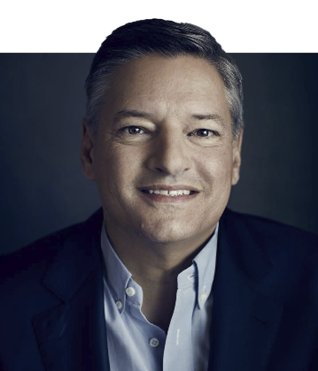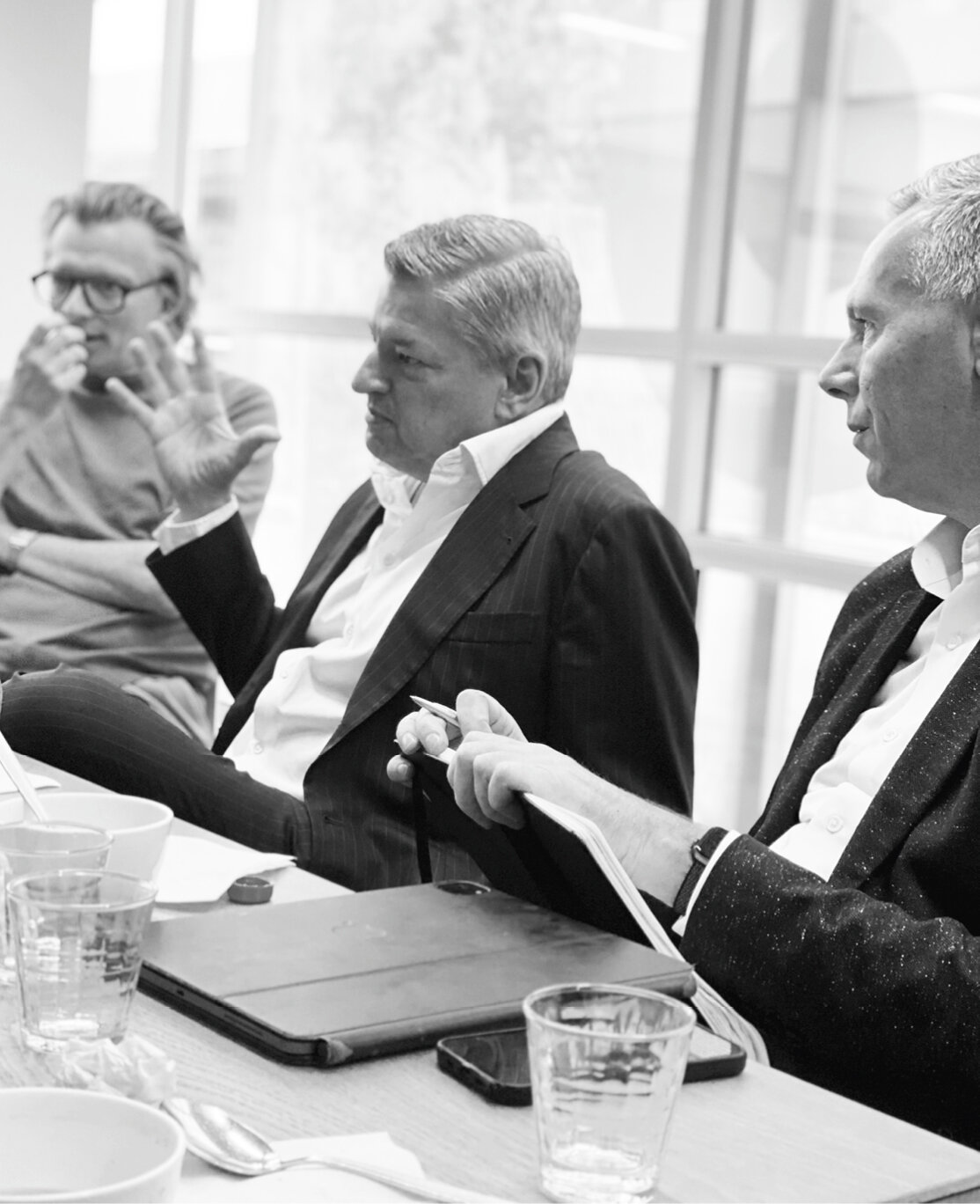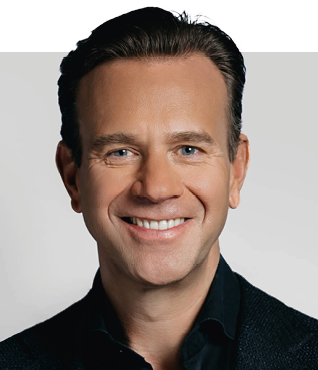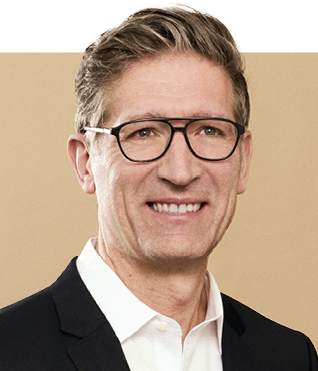audio & video

“People want to be moved by local stories”
The streaming market is developing at a rapid pace. After gaining a foothold with Streamz, DPG Media has now set its sights on RTL Netherlands and its successful Videoland platform. Is there room for local streamers in a field dominated by international giants? To answer this question, we sat down with the CEO of pioneer and market leader Netflix, and the executives behind Videoland in the Netherlands and Streamz in Flanders.

Ted Sarandos
CEO of Netflix. Joined Netflix when it was still sending its customers DVDs. As the mastermind behind the concept of binge- watching and original series like House of Cards, he has changed the way we watch TV forever.
Lessons from the video store
“When I was young, I ran a video store, and I noticed that people would come back very quickly when they had rented a series. So I figured they were watching all the episodes back to back. I also noticed how valuable recommendations were: if you liked one film, I knew which other films you would probably also like.”
Television is better than ever
“I’m very proud of the positive impact streaming has had on the art of storytelling. Writers are no longer bound by the old laws of television, which prescribed lots of repetition and superficial characters, because people didn’t watch every episode. Now TV shows really focus on the viewer, which means you can tell longer stories and develop characters in much greater depth. I think television is better now than it’s ever been. And there’s so much of it.”
Cancelling should be easy
“Mensen moeten het heel fijn vinden bij ons, met een perfecte gebruikservaring. Als je het heel makkelijk maakt om op te zeggen, helpt dat je business. Alleen als je steeds opnieuw waarde blijft bieden, blijven de mensen abonnee.”
A good boss gets out of the way
“The hardest part is hiring the right people. Choose talented people who think independently and are hungry to solve big problems. Once you’ve given those people the tools they need to do the best work of their lives, being a good boss mostly means getting out of the way. That recipe has worked really well for us. Some of the problems we face now are different than the ones we were dealing with five years ago, and not everyone is able to keep up. If that’s the case, you need to be honest and part ways.”
Room for local players alongside Netflix
“We also want to be local champions ourselves, with productions that are relatable to domestic audiences, like Ferry. We’re not just exporting Hollywood to the world. Squid Game, which was made by an unknown independent creator in South Korea, became our biggest hit. Entertainment is a huge market, so there will always be a lot of competition. The trend in streaming is towards consolidation, but I think there’s more than enough room for great local stories, which also means there’s room for local players like Videoland and Streamz. We hope that Netflix will always be people’s first subscription, but we will co-exist.”
Interactive content
“It will be interesting to see how games and interactivity are going to change the way we tell stories. You won’t be able to ‘play’ every movie you watch, but gaming elements and interactive experiences will give you a lot more influence.”

Ted Sarandos visited DPG Media late last year and spoke with several editors-in-chief.

Ferry (Netflix)

Mocro Maffia (Videoland)

Sven Sauvé
CEO of RTL Netherlands. Besides maintaining its rock-solid position in lin- ear television, RTL has also had success with its streaming service Videoland.
Videoland is unique in Europe
“We’ve been around for 10 years now. I never quite realised that the Netherlands is the only country where a local streaming service has managed to secure the second largest market share. Nowhere else in Europe has a local player managed to do that. So that’s something we’re very proud of. We’ve seen rapid growth, even in the past year, bucking all trends.”
People want local stories
“Our focus has been on exclusive local content from the very beginning. In addition, you can watch all our TV broadcasts on demand. There are fantastic international TV series, films and documentaries being made, but local productions always perform better. At the end of the day, I think people want local stories.”
Netflix in Dutch
“They’re working on a law that will require international players to invest in local productions. We’re already seeing that those major competitors are copying our themes, but we can do it better. These international giants normally play a global game with their content, while we are used to making local programmes that have to pay for themselves. Streaming consolidation is already in full swing. There’s so much content out there, and people have limited time. When the dust settles, I think every country will have about three international streamers and one local player.”
Diversifying to become number one
“We want to become number one by continuing to invest in local content and expanding across a wider range of genres. Mocro Maffia and reality TV, which made us big, are primarily targeted at younger demographics. We’re now investing in high-end drama, like our upcoming series Máxima, which is aimed at a wider Dutch audience. We’re also increasingly investing in documentaries. Meanwhile, we’re looking at how to integrate news and current affairs, and we want to add comedy and expand our sports offering. The goal is to keep growing by diversifying our content and appealing to a wider range of viewers in the Netherlands.”
A streaming service needs a different mindset
“If you want to do streaming well, you need a radically different mindset, because your competitors have no legacy. So as a company, you’re faced with a very steep learning curve. I’ve replaced almost my entire management team and 60% of the layer below. All content decisions for TV and streaming are made by Peter van der Vorst and his team. What hasn’t changed is our dedication to craftsmanship: we’ve invested in our own creative unit, which has developed formats like B&B Vol Liefde and De Verraders. We’re seeing very few hits based on new ideas out there, so I’m proud of what those creators do for our TV channels and Videoland.”

Dirk Lodewyckx
Director of Radio, TV and Streaming at DPG Media. Oversees Flanders’ largest commercial TV channel VTM, and radio
stations like Qmusic, as well as the Flemish streaming platform Streamz, a joint venture with Telenet.
Nerve-racking launch
“Deciding to launch VTM GO was absolutely nerve-racking. We wanted to meet consumers where they live, so we were the first to abandon traditional TV programming. Our viewers can watch whatever they want, whenever and wherever they want. This allowed VTM GO to hit the ground running and become the undisputed market leader in Flanders, a position it has held for the past four years. Every month, one million people use the app.”
Conquering the digital realm
“It’s our duty to convert VTM’s current market position in the analogue world to the digital realm, which is a massive challenge. Because in the analogue world, there are only three of us: VRT, Play and VTM. But online there are hundreds – even thousands – of providers. And yet we also want to be the digital market leader in video entertainment in Flanders.”
Streamz is a local complement to Netflix
“Is there a gap in the market for a local player in Flanders? That’s the question. And the answer is a resounding yes, provided you offer something different from the global players. That’s why Streamz changed its course last year, opting for a strategic focus on much more high-quality local content, from drama to documentaries. And the strategy is working: Streamz has become complementary to Netflix, giving Flemish consumers a reason to have more than one subscription.”
People want to laugh at homegrown jokes
“The best international content might be on Netflix, but the best Flemish dramas are on Streamz. This is already being backed up by the viewing figures: nine of the ten most watched productions on Streamz are Flemish. Our long-standing disadvantage as a small language area may now be working in our favour – people want to be moved by local stories. They want to laugh at homegrown jokes and be enthralled by true crime set in their own backyard. These productions resonate much more with our viewers’ own experiences because they’re more real, authentic and relevant.
We all need to brace ourselves
“Every global streaming service is looking at its bottom line these days. They’re investing much less in local productions, and Flanders is no different. But with the huge amount of content that’s available, it’s harder to stand out. A decade ago, TV channels could get away with the occasional hour of ‘filler’, but now people are quick to grab the remote to see what’s on Netflix or Disney+. Viewers have set the bar high, not just for content quality but also in terms of technology and business. So we all need to brace ourselves. Being in this chair has never been this challenging, but it’s also never been this much fun.”

F*** You Very, Very Much (Streamz)
Marleen Staal (Flair):
“Parels mag je
overal laten schitteren”
Voor Marleen Staal, Chef Digital bij Flair en naar eigen zeggen een ‘data-gekkie’, is de samenwerking tussen de DPG Media-vrouwentitels en een sterke focus op digitalisering inmiddels vanzelfsprekend. “We maken zó veel goede content, het is zonde om die maar voor één titel te gebruiken. Natuurlijk zou je kunnen redeneren dat je jouw parels, de beste verhalen, voor je eigen titel wilt houden. Dat gebeurt ook als het blad nog in de schappen ligt, maar ook daarna blijven het vaak prachtige verhalen. Je moet vooral goed nadenken wanneer je zo’n artikel uitserveert.”
In de praktijk gaat de samenwerking al verder dan alleen de bovengenoemde vrouwentitels, zegt Staal. “Artikelen van Ouders van Nu over opvoeden en Veronica Superguide over entertainment zijn voor onze doelgroep vaak ook interessant. Bij Flair hebben we de menskracht niet om die verhalen zelf te maken. Met aanpassingen in beeld worden dergelijke verhalen ook bij ons zeer goed gelezen.”
En nee, er is niet voor elke doorplaatsing een aparte vergadering nodig. Staal: “Als we zien dat een artikel het erg goed doet, vragen we direct of we het mogen overnemen.” Voor redacties die zijn opgegroeid met ‘papier’ en concurrentie tussen titels, is de ‘deelmodus’ misschien even wennen, maar de nieuwe generatie heeft daar geen problemen mee, merkt Staal. “Vroeger moest je vooral beter zijn dan je buurman. De jonge generatie is veel meer van ‘sharing is caring’: parels mag je overal laten schitteren.”
Merel Schut (Margriet):
“Lezers willen gewoon goede verhalen”
Ook Merel Schut, coördinator online bij Margriet, ziet dat het ‘experiment’ om content te delen inmiddels is uitgegroeid tot innige samenwerking. Met de nieuwe website van Margriet (in januari 2022 gelanceerd) plus app is Margriet bovendien veel meer datagedreven geworden. “Op de redactie hangt een dashboard met onder meer het dagbereik en de goed scorende verhalen.”
Dat zijn niet alleen ‘eigen’ verhalen. Schut: “Nouveau heeft vaak heel persoonlijke verhalen die goed scoren bij onze 60+-doelgroep. En een artikel van Ouders van Nu over uitgebluste oma’s die moeten zorgen voor hun kleinkinderen scoort bij ons ook ontzettend goed. Dergelijke succesvolle verhalen jagen we nog eens extra aan met bijvoorbeeld pushberichten.”
Volgens Schut is er nog een wereld te winnen in de analyse waarom sommige artikelen het geweldig doen en andere minder. In elk geval is de tijd van ‘alles’ zelf willen doen niet meer van deze tijd. “Wij doen zelf nauwelijks iets aan spiritualiteit. Als we een interessant artikel van Flow zien, plaatsen we dat wel door, met daarbij keurig de vermelding dat het van Flow komt.” Levert dat geen vraagtekens op bij lezers? Schut: “Nee, wij horen daar geen enkele klacht of opmerking over. Lezers willen gewoon goede verhalen.”